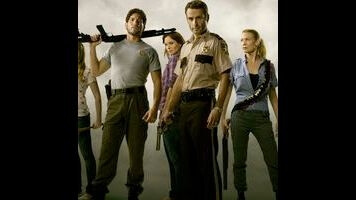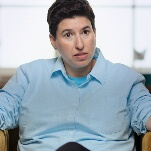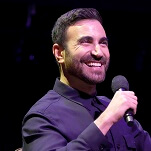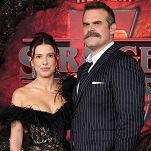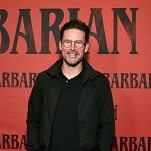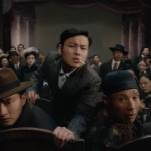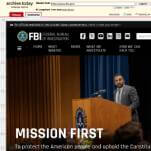The first time we saw Abraham, Rosita, and Eugene, it was hard to know what to make of them. The Walking Dead has had its share of oddballs, but this was something new: three characters who looked like caricatures of themselves right from the start. Abraham, with his mustache and too-bright red hair; Rosita in her short shorts; Eugene with his mullet. These were actors who had been made to look as much as possible like their comic book counterparts, and while that shouldn’t have been weird (this is, after all, a show based on a comic book), it kind of was. They didn’t seem to belong on this grim, po-faced TV series. Zombies, sure. Evil eye-patch wearing psychotics? Yeah, I can roll with that. But a dude who acted like he was on his way to a guest spot on The Big Bang Theory? That’s a bridge too far.
Yet these three have turned out to be more than okay. They’re likable, interesting people, and Abraham’s quest to bring Eugene to Washington has provided one of the first unexpected story directions in ages. The trio has helped to solidify the main ensemble as a group of folks who have different reasons for doing things, and different temperaments, but who all want more or less the same thing. This is the first time in maybe the entire run of the series where I don’t dread spending time with anyone in the cast. There’s no dead (ha) weight left, no irritating, badly drawn villains or heroes who will spend their screentime pontificating about bullshit because the writers think it sounds deep. As Abraham himself points out in this episode, simple Darwinism has resulted in a group of survivors who can take care of themselves if and when they need to (well, except for Eugene; he had to get creative), and that has made the show so much more exciting to watch.
The main reason last week’s episode wasn’t as thrilling as the three episodes which preceded it was because we spent most of the hour watching a bunch of people we’d never seen before, and likely won’t see much of again. (Beth was great though. And maybe Noah will stick around?) “Self Help” avoids that trap by checking back in with Abraham’s group on their madcap rush to Washington, D.C. It’s an unexpected choice, given how last week’s episode ended on a cliffhanger, but it’s a sign of how deep the ensemble is, and how confident the storytelling has become, that the choice actually works. Think of how less effective this would’ve been if, say, we kept cutting back to Rick and the others. By picking up story threads and spending a whole hour focusing on just one of them, the writers are taking a risk (what if they pick a story thread we don’t care about); but that risk is paying off.
“Self Help” is a bold episode in more ways than one. For most of its running time, it’s a smart, unsettling, and highly entertaining look at the new dynamics of Abraham’s little group of pseudo-soldiers. Unsettling not because any member of the group is evil or even cruel, but because of the tensions that can arise between people even when everyone has the same goal. As we’ve seen before, Abraham’s determination to get Eugene to D.C. borders on monomania, and yet that obsessive behavior doesn’t make him into a bad guy. It’s understandable, even before we see the flashbacks of what happened with the last group of people (his wife and children, presumably) he tried to protect. Thanks to Michael Cudlitz’s terrific performance, Abraham’s intensity is coupled with a gregarious nature that makes him compelling even when he’s being a stubborn ass. Instead of acting like a roadblock when the narrative needs tension, his behavior makes sense, even when he’s deciding on an apparent suicide run through a massive herd of zombies. This is what the apocalypse does to people. It sets them on a track, and makes that track the only thing they can see.
Which leads to the big revelation of the episode: Eugene’s confession that he can’t save the world; that he made the whole thing up to save his own skin. As twists go, the fact that Eugene was lying isn’t a stunner, but his decision to tell the truth this early in the season, and at this point in the trip, is shocking. It makes sense, as Abraham was about to beat the shit out of everybody in the group for not going along with his insane plan, but the reveal comes a lot sooner than I was expecting. I don’t know as I ever really believed the group would end up in the capital, but it at least gave them more to do than wander around the wilderness trying to survive. Now the quest is pretty much gone, unless Abraham goes full Ahab or something.
And yet, while it’s impossible to say for sure without seeing the rest of the season, this seems like the right choice. Eugene’s confession is a terrific scene, well-played by Josh McDermitt (McDermitt’s work has been growing on me; check out his performance at the end of Abraham’s flashback, when he seems almost normal in his fear, before switching into monotone scientist man to convince Abraham to help him), one that brings the whole rest of the episode into sharper focus, and it knocks off balance a plot that was threatening to become complacent. There’s comfort in giving characters a quest that will take them a long time to achieve, because it means a structure the writers can rely on for however many episodes it takes to achieve that quest. But the downside is, the audience will know what’s coming, and that knowledge can lead to staleness, either through repetition or the continual disappointment of expectations. By forcing Eugene to tell the truth now, the show sacrifices an objective before it had time to get completely stale.
It’s impressive, too, how smartly the episode builds to that reveal. Not just by showing us how determined Abraham is, and how that determination borders on madness; there are also multiple scenes of various people bonding with Eugene, which puts him in the impossible position of caring about people while telling them a lie that could easily get them all killed. And that lie makes sense, too. He wasn’t being malicious or vainglorious; he just realized that he had nothing of value to offer in this new world, and took the necessary steps to protect himself. You can argue the selfishness of that, and you can say he’s delusional, but this wasn’t an arbitrary decision on his part. And while his confession is less calculated, it still makes sense. The others had reached out to him, showed him compassion even when he was at his weirdest (spying on Abraham and Rosita having sex). The tension to tell them the truth even while knowing what that reveal would almost certainly cost must have been intense.
That’s the sort of tension that makes for great drama; and Abraham’s response (he pounds on Eugene for a bit before Rosita steps in) is at once awful and heartbreaking. “Self Help” has some good zombie action (Eugene with the fire hose for the win), and affecting character moments, and it built to a conclusion whose inevitability only seems painfully obvious in retrospect. I have no idea what will happen to this group the next time we see them. We don’t even know if Eugene will survive Abraham’s beating. But I am optimistic that whatever happens, it will be worth watching.
Stray observations:
- I’m not sure she got a stand-out scene in the hour (although standing up to Abraham at the end was great) but Christian Serratos is doing good work as Rosita. I hope we get some more backstory on her down the road.
- Oh hey, Glenn and Maggie were also present. They were fine, and Maggie’s chat with Eugene was a good scene. (She references Samson’s riddle, which also pops up in Stephen King’s The Dark Tower III: The Waste Lands. Maybe an intentional nod?)
- How great was that mullet conversation in the opening scene. So, so great. It’s amazing how much giving everyone a sense of humor can improve a show.
- “Party’s getting a bit long in the back. Or is it your source of power.” -Tara, re: Eugene’s hair.
- “Cards on the table, I was watching them.” -Eugene, re: Abraham and Rosita fucking. (I liked how odd this scene was; it could’ve been creepy, and it sort of was, but it just ended up mostly funny and pathetic. There’s something disarming about a person who knows they’re a mess and is completely up front about it.)
